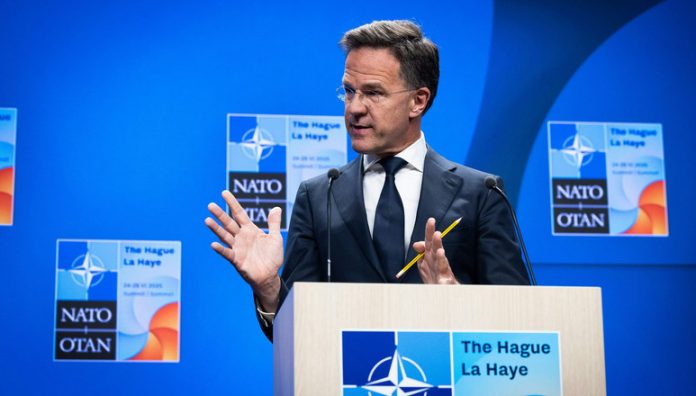The NATO summit opens in The Hague on Tuesday at an unprecedentedly difficult time for the participating countries. The alliance is divided on most key issues, from increasing defence spending to supporting Ukraine.
Amid growing internal divisions, the alliance is trying to maintain the appearance of unity. However, due to the unstable international situation, changing global security conditions and difficult relations with the US, the organisation faces serious challenges.
The NATO summit scheduled for June 24-26 has undergone many changes even before it began. In particular, the summit’s working programme, originally planned as a three-day event, has been reduced to a single 2.5-hour session. For a long time, the question of Volodymyr Zelensky’s participation in the event remained unresolved.
At the end of May, Zelensky was finally invited, but he will not have a full working programme or official meetings with state leaders. Moreover, the NATO-Ukraine Council meeting has been removed from the summit programme.
What about Ukraine
The leaders of 32 NATO member states are travelling to The Hague against the backdrop of escalating tensions in the Middle East and the military conflict in Ukraine, which has been ongoing for more than three years. Although these conflicts, according to the leaders of the alliance countries themselves, have become the main security challenge for the organisation, there are no plans to discuss them in detail at the summit.
At last year’s NATO summit in Washington, participants signed a final communiqué stating that Ukraine’s path to the alliance was “irreversible.” Since then, the situation has changed significantly. The new administration in Washington has made it clear that it does not expect Ukraine to join NATO.
Upon returning to the White House, US President Donald Trump immediately began negotiations with Russia and repeatedly made irritated remarks about Zelensky, once even kicking him out of the White House. The US position greatly alarmed European allies.
The NATO-Ukraine Council meeting will not take place during the summit precisely because of Washington’s unwillingness. Furthermore, it is still unclear how Ukraine will be mentioned in the final communiqué. Last week, the G7 summit ended without a joint statement in support of Ukraine and condemning Russia’s actions, as in previous years.
Furthermore, Kyiv’s desire to gain significant support in The Hague is complicated by the situation in the Middle East.
A few days before the summit, the US joined Israel in striking targets in Iran’s nuclear programme. Although Trump said on the evening of June 23 that Iran and Israel had reached a truce, it is not yet clear how close the conflict really is to ending and whether the truce will be observed. In a sense, the US strikes on Iran completely overshadowed the summit, which NATO leaders had been preparing for months.
Defence spending
Even several months before the NATO summit, it was clear that the main topic would be increasing defence spending. This is primarily due to Trump’s position. The US president has repeatedly said that European allies should increase their spending from the current 2% (which not all have achieved) to 5% of GDP. As the US is the dominant force in the alliance, Trump’s demands were taken seriously.
There is currently no unified position on increasing defence spending in NATO. Some countries began to increase their spending back in 2022, while others fear that increased defence spending will lead to cuts in social spending and cause voter discontent.
However, unanimous support from all member countries is required to approve the increase in military spending. NATO Secretary General Mark Rutte spent months trying to persuade the hesitant countries to agree to increase spending to 5%.
When he was close to achieving this goal, Spanish Prime Minister Pedro Sánchez said that his country would not agree to this measure. In a letter to Rutte, quoted by Reuters, he called the increase in spending “a counterproductive step that is incompatible with Spain’s view of the world.”
Sánchez’s move threatened to derail the summit. The compromise between NATO and Madrid was only reached on the evening of June 22. According to several media reports, the wording of the final communiqué was changed to achieve this.
Another problem concerns how exactly the increase in spending to 5% will be implemented in practice.
To reach a compromise, Rutte proposed the following scheme: NATO member states must promise to raise their core military spending to 3.5% of GDP by 2035 and spending on related infrastructure to 1.5%. He did not specify what infrastructure he meant.
Concessions to Trump
The main goal of this year’s summit will be to demonstrate the unity of the alliance, given the complex international situation and tensions between member countries.
Donald Trump has spoken sceptically about NATO on numerous occasions. Ahead of his return to the White House, there were fears in Europe that the US president might withdraw from the alliance or significantly reduce American support and presence on the continent. Trump himself said back in December that this would be possible if the alliance “doesn’t pay its bills.”
At the end of Trump’s first months in office, Washington, on the one hand, did not move closer to this step. On the other hand, the rhetoric from the White House and differences in views on key security issues, such as the conflict in Ukraine, caused considerable concern among European allies.
In order to demonstrate a united front and at the same time appease Trump, the organisers of the meeting decided to significantly shorten it. In essence, the main part of the summit will be reduced to two events: on the evening of June 24, the leaders will gather for an informal dinner, and on June 25, they will hold one meeting instead of the traditional two or three.
The meeting will be almost entirely devoted to the issue of defence spending. According to sources, the decision to shorten the summit programme was made “so that Trump does not get bored and leave early.”
